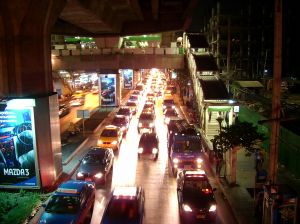After a couple wonky years where national traffic congestion rates declined due to a poor economy and higher fuel costs, researchers with the Texas Transportation Institute say that as the economy continues to improve so will we see our national traffic congestion index again reflect across-the-board increases.
The 2010 TTI urban mobility report findings suggest that 2008 was the “best” year for commuters in more than a decade. With that said, a review of 2009 data indicates that urban traffic congestion is again on the rise. Traffic got so bad in 2009 that congestion costs soared to $115 billion and the total amount of fuel wasted idling in traffic topped 3.9 billion gallons.

The Washington Post reports that the TTI annual evaluation has become a high-profile transportation industry resource, and that with its popularity have come questions from detractors regarding the survey parameters.
In some respects, our Boston car accidents attorneys agree that attempting to quantify and qualify commuter misery is as complex as glutted roadways are stressful. But, even more important (and treacherous) than establishing contributing factors is making fixes. Increased use of public transportation and more effective and efficient roadway operations (coordinated traffic signal engineering, for example) top the list.
According to the 2010 report, use of public transportation alone saved 640 million gallons of fuel and cut U.S. traffic delays by an additional 785 million hours.
But what does it all mean for Boston commuters, aside from an increased risk of being involved in a Boston car accident?
The Boston Globe reports that the Boston “metro region” spanning Rhode Island to New Hampshire ranked seventh on the TTI urban mobility report for most time commuters spend stuck in traffic during peak travel time.
Chicago, Los Angeles and Washington D.C. led the nation as the most congested cities. But Boston wasn’t far behind. Essentially, if you commute to work in or around Boston, in 2009 you spent two days – 48 hours – stuck in traffic.
With that said, use of public transit raked in an annual savings of 32.9 million hours, earning Boston a respectable fifth place in this category. As for coordinated traffic signals, Boston didn’t even make the top ten. Trimming just 5.1 million hours off the Boston commute earned the city 14th place. On a lighter note, while we do spend two days inching about the city, we squeak by the top 20 most stressful commutes at 21st.
The Massachusetts car accident lawyers at Jeffrey Glassman Injury Lawyers, LLC know that being involved in a serious or fatal Massachusetts traffic accident can be among the most trying experiences of a lifetime. If you or someone you love has been injured or killed in a Boston car accident, call us at 1.877.617.5333 or email us to schedule a free initial consultation.
 Boston Car Accident Lawyer Blog
Boston Car Accident Lawyer Blog

